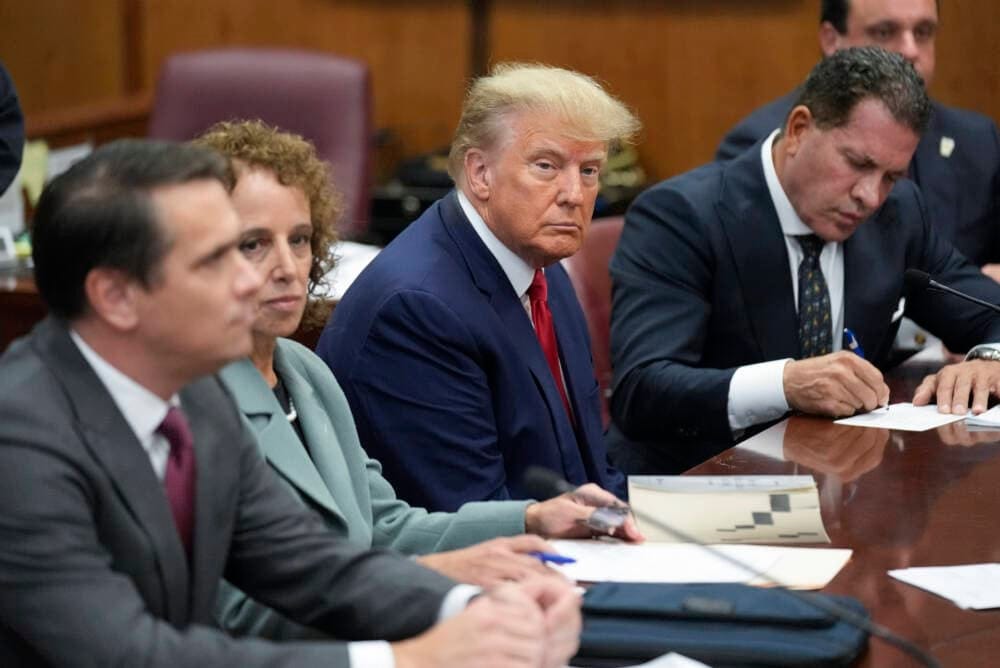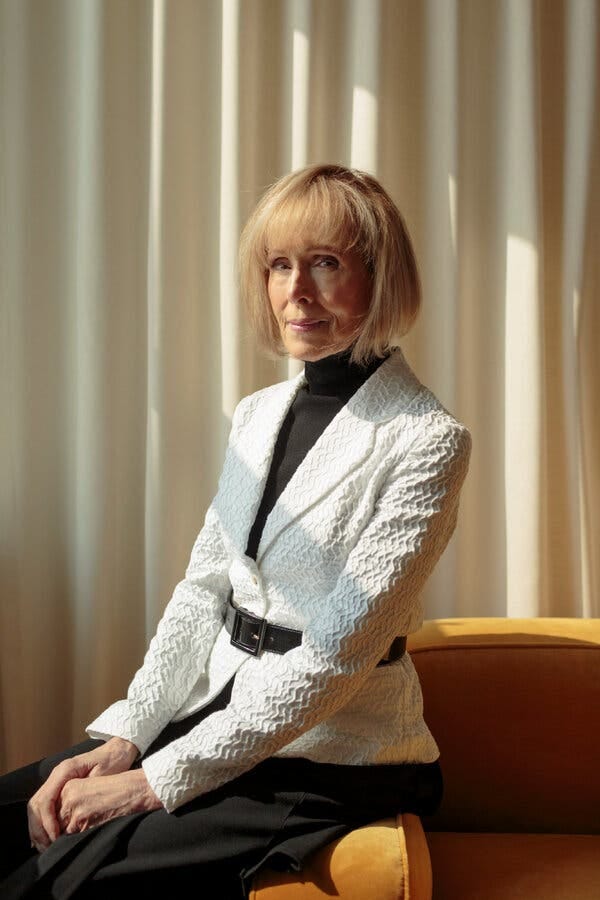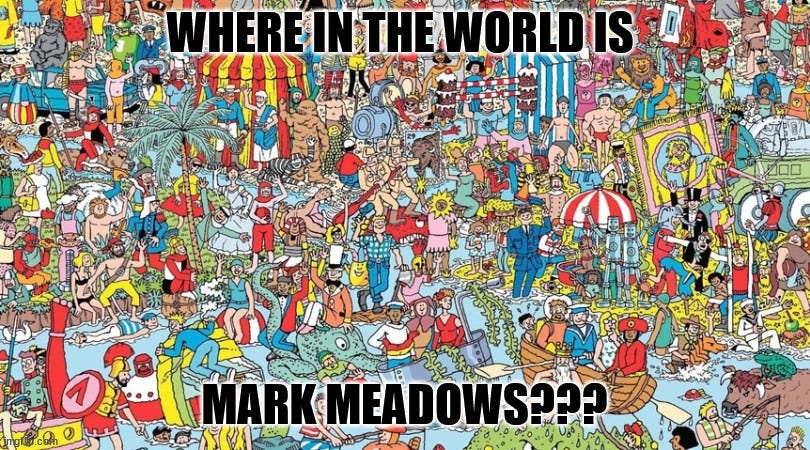On Tuesday, Donald Trump will attend a hearing in front of Judge Juan Merchan in Manhattan, by video. The hearing is part of the Manhattan DA’s criminal prosecution of Trump. The judge set the hearing for a very specific purpose: he wants to review his order regarding restrictions on sharing, with third-parties or the public, information revealed by the government to Trump in discovery. He will likely go over his order regarding access to and use of (i.e. no social media posts) evidence revealed by prosecutors to Trump in discovery. That’s a nice way of saying the judge is setting up Trump for contempt if he violates the order, by reviewing it with him, and confirming in court, on the record, that Trump understands the obligations the court has imposed and has the opportunity to respond and clarify as appropriate.
The protective order Judge Merchan entered provides that “any materials and information provided by the People to the Defense in accordance with their discovery obligations ... shall be used solely for the purposes of preparing a defense in this matter.” Trump is singled out in the order. He is limited to reviewing some materials in the presence of his lawyers and cannot be shown others, like witnesses’ cellphone records, without prior court approval.
There’s no doubt that an order like this creates a potential issue on appeal for Trump if he’s convicted. He will argue it violates his First Amendment rights, especially as a political candidate. Judge Merchan acknowledged Trump’s “special” status as a former president and a current candidate, and made clear at a prior hearing that the protective order was not a gag order and did not prevent Trump from speaking publicly about the case.
Protective orders like this are used when a defendant’s conduct threatens the safety and well-being of witnesses, victims, or anyone else related to the case. Prosecutors argued Trump’s history of making “harassing, embarrassing, and threatening statements” about other people in his various other legal disputes merited this action. Judge Merchan scheduled the hearing that requires Trump’s virtual attendance the day after Trump appeared on CNN’s town hall and lied, offered fake excuses, and insulted people. He called the prosecutors’ indictment in the Manhattan case a “fake charge.”
Prosecutors argued they needed “safeguards that will protect the integrity of the materials,” saying the “risk” that Trump would use them “inappropriately is substantial.” The Judge agreed, but noted, “I’m bending over backwards and straining to make sure that he is given every opportunity possible to advance his candidacy and to be able to speak in furtherance of his candidacy.” He said, “The last thing I want to do is infringe on his or anybody else’s First Amendment rights.” The question of whether he has succeeded in that goal will be answered by an appellate court if Trump is convicted.
The hearing is a bit of a watershed moment among efforts to hold the former president accountable. Judge Merchan is drawing a red line Trump can’t cross without finding himself in serious trouble. This sort of treatment of Trump by the judiciary is long overdue.
The prosecution will move forward in state court even as Trump’s lawyers try to move it to federal court. U.S. District Judge Alvin Hellerstein, to whom the matter is assigned, has set a schedule that suggests there will not be a decision on that request before late June at the earliest. Absent a move to federal court, this case is currently on track to go to trial next February or March, meaning the country may be treated to the spectacle of Trump on trial as he is competing in Republican primaries—more “firsts” for the former president. The first line of his obituary, which already will inevitably reference his status as the first twice-impeached, indicted former president, is getting more and more crowded.
One development I’ll be looking for this week involves E. Jean Carroll. We’re likely to learn whether she intends to sue Trump over his repeat defamation of her during the CNN town hall, just one day after a jury in New York entered a $5 million verdict against him for defaming her in 2022 and for sexual assault under New York’s Adult Survivors Act.
The most recent defamation took place while Trump was physically in New Hampshire, which makes that the most obvious venue to file a new lawsuit in. But it’s possible that Carroll’s capable lawyer may have a theory that would involve raising this most recent conduct by Trump either as a new charge or as part of the evidence in “Carroll I.” Carroll I is the first case that was filed, involving defamatory statements Trump made about Carroll while he was in office.
That case proceeded more slowly, because Trump argued that as a federal employee acting within the scope of his official duties, he was entitled to have the federal government take over his case. The Trump DOJ agreed, and surprisingly, Merrick Garland did not change course. In defending the position after the change in administration, DOJ told the court, “In making and defending a Westfall Act certification … the Department of Justice is not endorsing the allegedly tortious conduct or representing that it actually furthered the interests of the United States. Nor is a reviewing court making any such determinations in upholding the Department’s certification.” DOJ steps into the shoes of executive branch employees who are sued over conduct committed in the course of executing their official duties to avoid exposing them to large judgments. But there’s a hitch here, because the government is immune from being sued for defamation. If DOJ was permitted to substitute the government as the defendant for Trump personally, the case would be over. That’s the issue that’s been moving through the courts since the case was filed
The courts determined, and rightfully so based on legal rules, that a president is a government employee. The outrageous part of DOJ’s decision was to decide that a president who defamed a private citizen over conduct that occurred decades before he became president, and did it using the megaphone of the presidency to spread his comments far and wide, was acting within the scope of his official duties. Had Trump gone to Carroll’s home and shot her, there would have been no argument that was part of his official duties. The decision on the defamation seemed hard to defend; more of an excess from a DOJ intent on appearing non-political in the early days of the new administration.
After languishing for a couple of years in the Second Circuit Court of Appeals, that Court referred the issue to the courts in the District of Columbia for a decision because, under complicated rules about which jurisdiction’s laws should be applied to certain issues, that was the controlling law. Shortly before the case Carroll has just won went to trial, the D.C. courts said that the issue of whether an employee was acting within the scope of his duties was a question for the jury to decide. That ruling cleared the way for Carroll I to proceed to trial, and there’s no reason that can’t happen expeditiously. Now that a jury has found Trump’s comments were made with reckless disregard for the truth, perhaps DOJ will reconsider its earlier, ill-advised decision as well.
Finally, I continue to wonder, where is Trump’s former chief of staff Mark Meadows and what is his status? In early April, the D.C. Circuit Court of Appeals affirmed a district judge’s order that Meadows and other top Trump White House staffers must testify before the grand jury in DOJ’s January 6 investigation. Since then, nothing. I’m unable to find any reporting confirming he has testified or that a date has been scheduled.
Could that mean that Meadows, who has been notoriously uncooperative since first turning over some of his records to the House Jan. 6 committee, is finally cooperative? He ducked prosecution, both by North Carolina authorities over his false certification of residency in the state when he registered to vote and by DOJ for failing to fully comply with Congress’s subpoena during the committee hearings.
Other Jan. 6 witnesses suggested that Meadows was one of just a few aides who were at Trump’s side as the Jan. 6 attack unfolded. He also initiated and participated in Trump’s phone call to Brad Raffensperger where Trump begged the Georgia Secretary of State to “find” him enough votes to turn his defeat into a victory, despite the will of the voters. Previously, following a December 2020 meeting Meadows participated in at the White House with Trump and others, and where voter fraud and state electoral vote certifications were under discussion, Meadows traveled to Georgia hoping to observe absentee ballot auditing. Meadows, if he did cooperate, would be a key witness. But there is no real indication one way or the other, although his prolonged silence is interesting. Meadows, once a prolific tweeter, does not appear to have done so since late February of this year, but that could also be because he’s shifted to conservative social media, or for some other reason.
Last year, the South Carolina Supreme Court ordered Meadows to testify in front of the Fulton County, Georgia, grand jury investigating Trump’s efforts to interfere with the election results in Georgia. No word on whether he is under the microscope there, and if so, whether as witness or defendant.
It would not be The Week Ahead at Civil Discourse without at least some mention of Justice and Mrs. Clarence Thomas, so I’ll close this out with a reminder that Ginni Thomas was in touch with Meadows ahead of the insurrection, sending Meadows several texts encouraging him to stand firm and support Trump’s claims that widespread fraud stole the election from him. That one fact alone makes the Justice’s participation in any case related to the election, and possibly to the former president, stunningly inappropriate. When Mrs. Thomas testified before the Jan. 6 committee, she said, “You know, it was an emotional time … I’m sorry these texts exist.” I’d be willing to bet all of the conservative justices on the court, Harlan Crow, Leonard Leo, and many others share this sentiment with her.
Mark Meadows—along with other Trump lawyers, like Jeffrey Clark, the wannabe attorney general, and John Eastman, who manufactured the fake slate of electors scheme—is someone who is likely to have a conversation with prosecutors before a potential Jan. 6 case is indicted to determine whether they want to be witnesses or defendants. Prosecutors will want them as witnesses because of their proximity to Trump and the potential that they can testify about his actions, his knowledge their plan was illegal, and his intentions. DOJ has managed to keep its case under the radar screen. There is no reason to believe any of this will surface this week, but Meadows’s absence in the public square continues to be on my mind. There seems to be slow but steady movement towards justice, although we still don’t know precisely what form it will take. Perhaps we’ll learn more this week.
We’re in this together,
Joyce







I really appreciate your briefs on courtroom procedures and protocols, especially since we will be seeing much more courtroom action at this stage of the Sturm und Drang show that is Trump. All of us without a law degree owe you a debt of honor for taking us beyond Perry Mason.
Golly Joyce, just reading your round up of all that is going on makes me realize what a stupendous task the DOJ has in trying to round up all the criminality associated with the last administration. I’m almost willing to bet though that as far as Mark Meadows is concerned, he’s probably lolled back in his easy beach chair at his South Carolina home and out of any incoming fire from the press. It’s just ridiculously hard to recognize this country that I grew up in rapidly reverting to the 19th Century by a minority of old white men! How utterly disgusting that my generation, along with several younger than I, are leaving this mess to our grandchildren. I’ll be 77 Wednesday and I just hope I live long enough to see tfg get all the Justice he deserves.